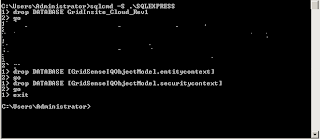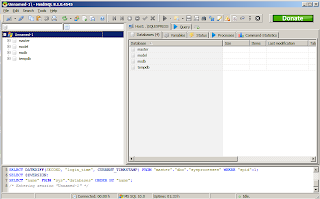Wednesday, November 27, 2013
PPP connection trouble shooting
[1] http://rsc.anu.edu.au/General/linux_ppp/ANU-PPP-HOWTO-5.html
From [1]
A Working pppd Connection
The following is the output you should see from various commands while a correctly configured ppp connection is open.
last | less instead.
LCP Link Control Protocol
PAP Password Authentication Protocol
IPCP Internet Protocol Control Protocol



From [1]
A Working pppd Connection
The following is the output you should see from various commands while a correctly configured ppp connection is open.
ambceal@anuhost 1> last | head -1 amcbeal pts/1 h138.anu.uniras. Sat Apr 17 10:50 still logged inIf other people have logged onto the ANU host after you, use
last | less instead.
Your computer at home should show something like the following. With no ppp connection, the lo section would be the only part displayed.
amcbeal [home] 165> ifconfig
lo Link encap:Local Loopback
inet addr:127.0.0.1 Mask:255.0.0.0
UP LOOPBACK RUNNING MTU:3924 Metric:1
RX packets:6 errors:0 dropped:0 overruns:0 frame:0
TX packets:6 errors:0 dropped:0 overruns:0 carrier:0
collisions:0
ppp0 Link encap:Point-to-Point Protocol
inet addr:203.108.55.138 P-t-P:203.108.192.15 Mask:255.255.255.255
UP POINTOPOINT RUNNING NOARP MULTICAST MTU:1500 Metric:1
RX packets:9 errors:0 dropped:0 overruns:0 frame:0
TX packets:10 errors:0 dropped:0 overruns:0 carrier:0
collisions:0
If you are on the slower subnet, the first part of the ppp0 section will show a different subnet for "inet addr"...ppp0 Link encap:Point-to-Point Protocol
inet addr:203.108.192.94 P-t-P:203.108.192.14 Mask:255.255.255.255
The output from route on your computer at home.
Without a ppp connection, only the loopback route (127.0.0.0) is shown.
Without a ppp connection, only the loopback route (127.0.0.0) is shown.
amcbeal [home] 163> route Kernel IP routing table Destination Gateway Genmask Flags Metric Ref Use Iface termcan2.ozemai * 255.255.255.255 UH 0 0 0 ppp0 127.0.0.0 * 255.0.0.0 U 0 0 0 lo default termcan2.ozemai 0.0.0.0 UG 0 0 0 ppp0
Debugging Output Written to /var/log/ppplog
The actual output looks like this...Apr 20 15:57:58 localhost pppd[479]: pppd 2.3.5 started by root, uid 0...however I've removed the date and hostname for brevity.
The first part is the output from chat.
pppd[479]: pppd 2.3.5 started by root, uid 0 chat[480]: send (AT^M) chat[480]: expect (OK) chat[480]: AT^M^M chat[480]: OK chat[480]: -- got it chat[480]: send (ATDT 62578155^M) chat[480]: expect (CONNECT) chat[480]: ^M chat[480]: ATDT 62578155^M^M pppd[479]: Serial connection established. chat[480]: CONNECT chat[480]: -- got itNow it switches to ppp. Some of the abreviations it uses are:
LCP Link Control Protocol
PAP Password Authentication Protocol
IPCP Internet Protocol Control Protocol
pppd[479]: Using interface ppp0 pppd[479]: Connect: ppp0 <--> /dev/modem pppd[479]: sent [LCP ConfReq id=0x1 <magic 0x8c5561c2> <pcomp> <accomp>] pppd[479]: rcvd [LCP ConfReq id=0x1 <asyncmap 0x0> <auth pap> <magic 0x3a9e2b78> <pcomp> <accomp>] pppd[479]: sent [LCP ConfAck id=0x1 <asyncmap 0x0> <auth pap> <magic 0x3a9e2b78> <pcomp> <accomp>] pppd[479]: sent [LCP ConfReq id=0x1 <magic 0x8c5561c2> <pcomp> <accomp>] pppd[479]: rcvd [LCP ConfAck id=0x1 <magic 0x8c5561c2> <pcomp> <accomp>] pppd[479]: sent [PAP AuthReq id=0x1 user="amcbeal" password="ca1op3x"] pppd[479]: sent [PAP AuthReq id=0x2 user="amcbeal" password="ca1op3x"] pppd[479]: rcvd [PAP AuthAck id=0x1 ""] pppd[479]: Remote message: pppd[479]: sent [IPCP ConfReq id=0x1 <addr 0.0.0.0> <compress VJ 0f 01>] pppd[479]: rcvd [IPCP ConfReq id=0x2 <compress VJ 0f 01> <addr 203.108.192.14>] pppd[479]: sent [IPCP ConfAck id=0x2 <compress VJ 0f 01> <addr 203.108.192.14>] pppd[479]: rcvd [IPCP ConfNak id=0x1 <addr 203.108.55.26>] pppd[479]: sent [IPCP ConfReq id=0x2 <addr 203.108.55.26> <compress VJ 0f 01>] pppd[479]: rcvd [IPCP ConfAck id=0x2 <addr 203.108.55.26> <compress VJ 0f 01>] pppd[479]: local IP address 203.108.55.26 pppd[479]: remote IP address 203.108.192.14The following appears after you close the connection with /etc/ppp/scripts/ppp-off
pppd[479]: Terminating on signal 2. pppd[479]: sent [LCP TermReq id=0x2 "User request"] pppd[479]: rcvd [LCP TermAck id=0x2] pppd[479]: Connection terminated. pppd[479]: Exit.
ppplog Output from a Working pppd Connection using CHAP
pppd[1160]: pppd 2.4.0 started by root, uid 0 chat[1161]: abort on (BUSY) chat[1161]: abort on (ERROR) chat[1161]: abort on (NO CARRIER) chat[1161]: abort on (NO DIALTONE) chat[1161]: abort on (Invalid Login) chat[1161]: abort on (Login incorrect) chat[1161]: send (AT^M) chat[1161]: expect (OK) chat[1161]: AT^M^M chat[1161]: OK chat[1161]: -- got it chat[1161]: send (ATDT62617444^M) chat[1161]: expect (CONNECT) chat[1161]: ^M chat[1161]: ATDT62617444^M^M chat[1161]: CONNECT chat[1161]: -- got it pppd[1160]: Serial connection established. pppd[1160]: using channel 1 pppd[1160]: Using interface ppp0 pppd[1160]: Connect: ppp0 <--> /dev/modem pppd[1160]: sent [LCP ConfReq id=0x1] pppd[1160]: rcvd [LCP ConfReq id=0x1 < 00 04 00 00> ] pppd[1160]: sent [LCP ConfRej id=0x1 < 00 04 00 00> ] pppd[1160]: rcvd [LCP ConfAck id=0x1 ] pppd[1160]: rcvd [LCP ConfReq id=0x2 ] pppd[1160]: sent [LCP ConfAck id=0x2 ] pppd[1160]: rcvd [CHAP Challenge id=0x1 , name = "tnt3.cbr1"] pppd[1160]: sent [CHAP Response id=0x1 , name = "amcbeal@ozemail.com.au"] pppd[1160]: rcvd [CHAP Success id=0x1 "\000"] pppd[1160]: Remote message: ^@ pppd[1160]: sent [IPCP ConfReq id=0x1 ] pppd[1160]: sent [CCP ConfReq id=0x1 ] pppd[1160]: rcvd [IPCP ConfReq id=0x1 ] pppd[1160]: sent [IPCP ConfAck id=0x1 ] pppd[1160]: rcvd [IPCP ConfNak id=0x1 ] pppd[1160]: sent [IPCP ConfReq id=0x2 ] pppd[1160]: rcvd [LCP ProtRej id=0x3 80 fd 01 01 00 0f 1a 04 78 00 18 04 78 00 15 03 2f] pppd[1160]: rcvd [IPCP ConfAck id=0x2 ] pppd[1160]: local IP address 210.84.37.27 pppd[1160]: remote IP address 210.84.63.40 pppd[1160]: Script /etc/ppp/ip-up started (pid 1180) pppd[1160]: Script /etc/ppp/ip-up finished (pid 1180), status = 0x0
If your chap-secrets file is missing or incorrect, you might see something like this after it switches to ppp:
pppd[3370]: Serial connection established. pppd[3370]: using channel 1 pppd[3370]: Using interface ppp0 pppd[3370]: Connect: ppp0 <--> /dev/modem pppd[3370]: sent [LCP ConfReq id=0x1] pppd[3370]: rcvd [LCP ConfReq id=0x1 < 00 04 00 00> ] pppd[3370]: sent [LCP ConfRej id=0x1 < 00 04 00 00> ] pppd[3370]: rcvd [LCP ConfAck id=0x1 ] pppd[3370]: rcvd [LCP ConfReq id=0x2 ] pppd[3370]: sent [LCP ConfAck id=0x2 ] pppd[3370]: rcvd [CHAP Challenge id=0x1 , name = "tnt3.cbr1"] pppd[3370]: No CHAP secret found for authenticating us to tnt3.cbr1 pppd[3370]: sent [CHAP Response id=0x1 <68937d227c92b8d9b8b7f64d83214a1a>, name = "amcbeal"] pppd[3370]: rcvd [CHAP Failure id=0x1 "\000"] pppd[3370]: Remote message: ^@ pppd[3370]: CHAP authentication failed pppd[3370]: sent [LCP TermReq id=0x2 "Failed to authenticate ourselves to peer"] pppd[3370]: rcvd [LCP TermAck id=0x2] pppd[3370]: Connection terminated. pppd[3370]: Exit.
If you try to connect to a server and the string <auth chap 80> shows up in the ppplog file, it probably means the server is using a Microsoft variation of CHAP called MSCHAP. You will need to recompile pppd to support this. See README.MSCHAP80 in the pppd source. Fortunately OzEmail does not use MSCHAP so I haven't had to deal with it.
Wednesday, November 6, 2013
HeidiSQL --- easy-to-use interface and a "working-horse" for web-developers using MySQL-Database
[1] www.heidisql.com
[2] Google code: code.google.com/p/heidisql/
HeidiSQL is a lightweight, Windows based application for managing MySQL and Microsoft SQL databases. It enables you to browse and edit data, create and edit tables, views, procedures, triggers and scheduled events. Also, you can export structure and data either to SQL file, clipboard or to other servers.
[2] Google code: code.google.com/p/heidisql/
HeidiSQL is a lightweight, Windows based application for managing MySQL and Microsoft SQL databases. It enables you to browse and edit data, create and edit tables, views, procedures, triggers and scheduled events. Also, you can export structure and data either to SQL file, clipboard or to other servers.
Subscribe to:
Comments (Atom)




